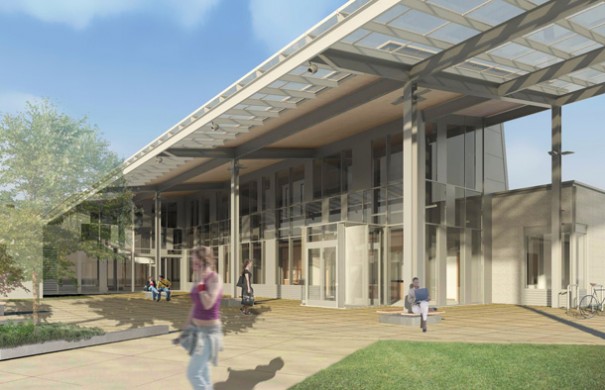This content was published: January 11, 2011. Phone numbers, email addresses, and other information may have changed.
Hennebery Eddy Architects nabs coveted architecture honor for PCC Newberg Center
Photos and story by Gina Whitehill-Baziuk
Portland Community College’s Newberg Center is garnering accolades – before it’s even built.
The facility’s design, created by Hennebery Eddy Architects, was named runner-up in the “As Designed” category by Architecture 2030 at the first-ever 2030 Challenge Design Awards that took place in October 2010.

Artist rendering of the PCC's future campus in Newberg, Oregon.
Hennebery Eddy also took home runner-up honors in the “As Built” category for its design of Willamette University’s Ford Hall.
The awards were announced in collaboration with the American Institute of Architects, Portland Chapter; its Committee on the Environment; and the BetterBricks Initiative of the Northwest Energy Efficiency Alliance. Winners were selected from projects submitted for AIA Portland’s 2010 Design Awards.
“We’ve been excited since day one about our Newberg Center project. With its sustainability features, this building is one of the first of its kind, anywhere,” said Tim Eddy, principal, Hennebery Eddy. “To receive this honor is ‘extra’ – like icing on the cake.”
Now under construction, the PCC Newberg Center will be completed and open by fall 2011. The 13,500 sq. ft. facility aims to be one of the first NetZero/carbon-neutral academic buildings – meaning it will generate 100 percent fewer carbon dioxide emissions than the average building in the United States of the same type and size.
The facility will provide natural day lighting, maximizing northern and southern exposures, and natural ventilation. With the addition of a super-insulated building skin and thermal mass in the floor and shear walls, the building’s design will eliminate all mechanical cooling and nearly all mechanical ductwork.
“The PCC Newberg Center will move the college forward in achieving its Climate Action Plan goal of reducing greenhouse gas emission levels 40 percent by 2030 and 80 percent by 2050,” said Linda Gerber, PCC Sylvania Campus president. “Hennebery Eddy’s work on this building – and its eventual sustainability outcomes – is impressive.”
Architecture 2030 is a non-profit, non-partisan organization established in 2002 in response to the climate change crisis. Its mission is to achieve a dramatic reduction in the climate change-causing greenhouse gas (GHG) emissions created by the building sector, the major worldwide source of by-product GHG. To accomplish this, the organization issued the 2030 Challenge asking the global architecture and building community to adopt a series of percentage targets to reduce GHG, so that by 2030 buildings will be carbon-neutral.
Entries in the 2030 Challenge Design Awards were asked to project energy usage that meets or exceeds the 2030 Challenge targets. In addition to reduced energy consumption, submissions were required to include a calculation of operational carbon dioxide emissions. The PCC Newberg Center fit the criteria required.
“Hennebery Eddy’s expertise in designing green academic facilities was the leading reason we chose them as our architecture firm for the Newberg Center,” said Gerber. “Based on these honors, we’re clearly not alone in recognizing Hennebery Eddy’s high caliber.”
Other 2030 Challenge Design award winners were Opsis Architecture, winner of the “As Built” category for Hood River Middle School, and SERA Architects, winner of the “As Designed” category for the Edith Green/Wendell Wyatt Federal Building.
For more information about Hennebery Eddy, visit: www.henneberyeddy.com
